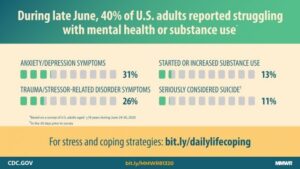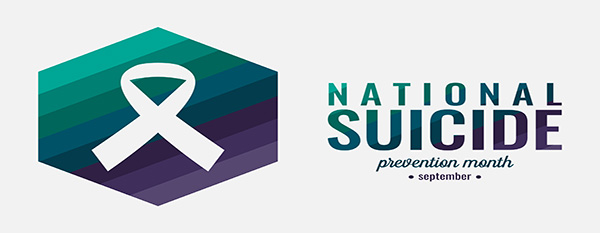All month, mental health advocates, prevention organizations, survivors, allies, and community members unite to promote suicide prevention awareness.
According to the Centers for Disease Control and Prevention (CDC), nearly 45,000 Americans die by suicide every year, which translates to 121 suicides per day. The National Alliance on Mental Illness states that suicide is the 10th leading cause of death in the U.S., the third leading cause of death for people aged 10–14, and the second leading cause of death for individuals aged 15–24.
National Suicide Prevention Week is September 7-13 surrounding World Suicide Prevention Day on September 10.
It’s a time to remember those affected by suicide, to raise awareness, and to focus efforts on directing treatment to those who need it most.
Mental health issues are rising among adults during the COVID-19 pandemic, according to the Centers for Disease Control and Prevention. While safety measures such as social distancing are proven to reduce the spread, the CDC states: “the potential for adverse outcomes on suicide risk is high.”
From June 24 to 30, the CDC reported that U.S. adults reported mental health conditions in higher numbers due to COVID-19.

The rates of those reported having seriously considered suicide in the 30 days before the June CDC survey are higher among those between ages 18-24 (25.5%), essential workers (21.7%), and minority racial/ethnic groups (18.6% Hispanic, 15.1% non-Hispanic Black).
WARNING SIGNS
You should reach out for professional help if you or someone you know is showing any of the following warning signs:
- Talking about feeling trapped or in unbearable pain
- Talking about being a burden to others
- Giving away prized possessions
- Increasing the use of alcohol or drugs
- Acting anxious or agitated; behaving recklessly
- Sleeping too little or too much
- Withdrawing or feeling isolated
- Showing rage or talking about seeking revenge
- Displaying extreme mood swings
THERE IS HELP!
There are several ways you can go about getting help. If you are employed or have insurance, you can call the behavioral health phone number on the back of your health insurance card or see if your employer offers an Employee Assistance Program (EAP). You can also call a local counseling office and schedule an urgent appointment. People who are facing a suicidal crisis or emotional distress can call the National Suicide Prevention Lifeline at (800) 273-8255. More than 100 local crisis centers are a part of a national network working on this lifeline and are available 24 hours a day, seven days a week.

